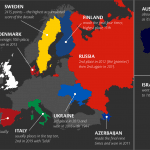 Over the weekend we saw the greatest annual event in the world. No it wasn’t a football match. It was the 59th time the event was run.
Over the weekend we saw the greatest annual event in the world. No it wasn’t a football match. It was the 59th time the event was run.
The Eurovision Song Contest was set up to, both, bring Europe together and to test the new Eurovision network. This network allowed the sharing of television and radio over large distances – the network is still in place and possibly the greatest legacy of the contest. The first country to win was Switzerland. Even today, we don’t know how many points, if any, the country received as they have never been released.
Now it is one of the biggest, non sporting, television events of the year with about 200 million viewers from not only from Europe but around the world. It is also one of the longest running television shows. America and Australia also love the show.
For something as vapid as the event you wouldn’t expect it to help start a military coup. This happened in 1974 when the Portuguese revolutionaries used the entry to alert the rebel soldiers to start the coup. The song ended up 14th in the contest with 3 points. The contest’s winner was from Sweden with a song called Waterloo.
I love the contest. Not really for the songs as we know that they will be dubious. It’s the technology that I love. How do you get live pictures from one location to around Europe? Today it’s easy. Just book some satellite time and you’re away.
When the annual extravaganza started almost 6 decades ago, We didn’t have any satellites orbiting the earth. It was at the end of the decade we saw the Russians launch Sputnik 1. Then it had to be connected around Europe by, basically, bits of copper wire.
From it’s humble beginnings, the event has gone from strength to strength. Every year, the event is in a different country – OK, it was in Ireland for most of the 90s but just change it from country to location! Each broadcaster tries to better last year’s attempt. Pushing the boundaries of the technology of the day.
Even war hasn’t stopped countries sending contestants. This happened in the 90s with Yugoslavia. Having to run to your flight because you could be shot by snipers says something about the contest.
One of the main criticisms of the contest is the voting. The way that “blocks” vote for each other. This maybe partisan or just the fact that they have similar tastes in music.
The main, nerve-racking piece of the voting is when the national jury gives their votes. Today is it done “in vision”. Until the 90s this was done over a phone line and, even today I hope that there are going to be technical issues. They had a couple of issues in the 2014 contest. One country didn’t appear to start with but that was fixed within a minute. A couple of issues with the sound from a couple of countries.
In the 70s & 80s it wasn’t unusual to have quite major issues with getting the votes into the venue. quality was quite variable across Europe at the time. I do remember one contest that the phone used to call the relevant country’s jury changed a couple of times throughout the voting process.












